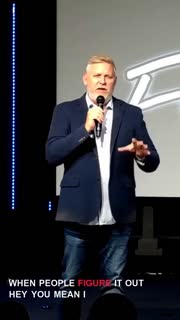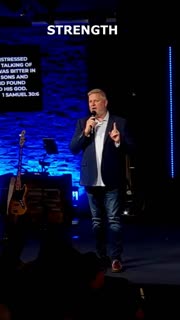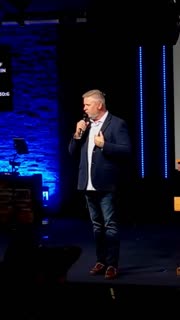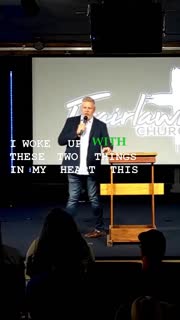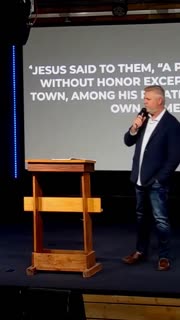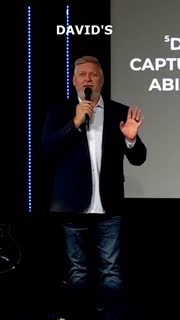Empowered Faith: Choosing Joy and Self-Ministry
Devotional
Sermon Summary
Bible Study Guide
Sermon Clips
### Quotes for Outreach
1. "Faith is just an action. That's it. When you decide to do something you couldn't do before. Guess what that is? Faith is just an action. It's saying, you know what? I wasn't able to bend over like that before. I'm going to try it. I wasn't able to turn my leg that way before. I'm going to do it today and give God the glory. You know what? I have never been able to do that or do this or dance or raise my hands or get out of my chair. I'm just going to do it today. It's an action. That's all faith is. Don't overcomplicate it." [02:58] (31 seconds)
2. "When people figure it out, hey, you mean I can forgive this person and it doesn't mean that I'm saying what they did to me was right? Absolutely. It doesn't mean that. When I caught on to that revelation, I forgave everybody. But until then, I thought this way. I thought, well, I didn't do nothing wrong to deserve that. I was a victim. I didn't deserve that. I didn't deserve that. So no, I'm mad at them. I'm never going to forgive them because I didn't do anything wrong." [41:05] (23 seconds)
3. "David found strength in the Lord, his God. So what did David do? He strengthened himself. He ministered to himself first. He didn't get on his knees and pray to God. He didn't ask God, should we go after him or not go after him? He didn't go to the men and accuse the men. Have I not done all this stuff for you? Do you not owe me your allegiance? He didn't do any of that. He didn't confront them. He didn't yell at them. He didn't get angry and bitter with them. The first thing he did was he ministered to himself. He strengthened himself." [01:09:24] (42 seconds)
4. "Do you know how to put on the garment of praise to deal with the spirit of anxiety? Do you know how to put on the garment of praise to deal with the spirit of depression? Do you know how to put on the garment of praise to deal with the spirit of suicide? Do you know how to minister to yourself? David found strength in the Lord first." [01:10:38] (26 seconds)
5. "When you dance, sickness has to go. Listen, there's things that dancing, baptizing removes that other things cannot." [01:15:21] (91 seconds)
### Quotes for Members
1. "I woke up with these two things in my heart this morning. I want to share them with you real quick. Maybe they'll minister to you as I ponder them and they've ministered to me. Two things I woke up my heart with is his mercy is made new every morning. The other thing is, is his mercy made new every morning or has his mercy already been fulfilled for us on the cross and we can experience in its fullness every single day? It does every hour, every night, every evening, every morning." [33:34] (42 seconds)
2. "You know, Jesus couldn't go back into his hometown because people were so filled full of disbelief because they watched him grow up as a kid. You know, Jesus couldn't go back into his hometown because people were so filled full of disbelief and they couldn't receive the miracles. He says, the Bible says he could do no miracles there. So a person is without honor in his own hometown. I see this a lot and I see people experiencing rejection where they grew up." [46:29] (36 seconds)
3. "David rides back to Ziglag and it's on fire. Some enemies, the Amalekites, came in to David's town while he wasn't there. Destroyed it. Took your, imagine if your kids were taken, your wives. Everything you owned was taken. Now check this out. You ready? Look at all the rejection David's experienced. Right? Let's look at this betrayal." [01:06:46] (32 seconds)
4. "David's two wives had been captured, Ahenom and Jezreel, and Abigail and the widow of Nabal of Carmel. Here it is. David was greatly distressed because the men were talking of killing him. What? His 600 men, now he's being rejected by his 600 men that he has fought for, lived with, that owe him allegiance? You mean now his 600 men of great stature? Men of valor are talking about killing him? Hold on a second. That's not it. Each one was bitter in spirit because of his sons and daughters. Now check this out. This is it. But David found strength in the Lord, his God." [01:08:29] (57 seconds)
5. "How many people when they get rejected automatically as a first responder have a default in them that chooses joy? Or the minute you experience rejection, you automatically choose, I'm hurt, I'm withdrawing, I'm going to lash out, I'm going to bite your head off. How many people can minister to themselves properly?" [01:12:38] (32 seconds)
Ask a question about this sermon
1. "Faith is just an action. That's it. When you decide to do something you couldn't do before. Guess what that is? Faith is just an action. It's saying, you know what? I wasn't able to bend over like that before. I'm going to try it. I wasn't able to turn my leg that way before. I'm going to do it today and give God the glory. You know what? I have never been able to do that or do this or dance or raise my hands or get out of my chair. I'm just going to do it today. It's an action. That's all faith is. Don't overcomplicate it." [02:58] (31 seconds)
2. "When people figure it out, hey, you mean I can forgive this person and it doesn't mean that I'm saying what they did to me was right? Absolutely. It doesn't mean that. When I caught on to that revelation, I forgave everybody. But until then, I thought this way. I thought, well, I didn't do nothing wrong to deserve that. I was a victim. I didn't deserve that. I didn't deserve that. So no, I'm mad at them. I'm never going to forgive them because I didn't do anything wrong." [41:05] (23 seconds)
3. "David found strength in the Lord, his God. So what did David do? He strengthened himself. He ministered to himself first. He didn't get on his knees and pray to God. He didn't ask God, should we go after him or not go after him? He didn't go to the men and accuse the men. Have I not done all this stuff for you? Do you not owe me your allegiance? He didn't do any of that. He didn't confront them. He didn't yell at them. He didn't get angry and bitter with them. The first thing he did was he ministered to himself. He strengthened himself." [01:09:24] (42 seconds)
4. "Do you know how to put on the garment of praise to deal with the spirit of anxiety? Do you know how to put on the garment of praise to deal with the spirit of depression? Do you know how to put on the garment of praise to deal with the spirit of suicide? Do you know how to minister to yourself? David found strength in the Lord first." [01:10:38] (26 seconds)
5. "When you dance, sickness has to go. Listen, there's things that dancing, baptizing removes that other things cannot." [01:15:21] (91 seconds)
### Quotes for Members
1. "I woke up with these two things in my heart this morning. I want to share them with you real quick. Maybe they'll minister to you as I ponder them and they've ministered to me. Two things I woke up my heart with is his mercy is made new every morning. The other thing is, is his mercy made new every morning or has his mercy already been fulfilled for us on the cross and we can experience in its fullness every single day? It does every hour, every night, every evening, every morning." [33:34] (42 seconds)
2. "You know, Jesus couldn't go back into his hometown because people were so filled full of disbelief because they watched him grow up as a kid. You know, Jesus couldn't go back into his hometown because people were so filled full of disbelief and they couldn't receive the miracles. He says, the Bible says he could do no miracles there. So a person is without honor in his own hometown. I see this a lot and I see people experiencing rejection where they grew up." [46:29] (36 seconds)
3. "David rides back to Ziglag and it's on fire. Some enemies, the Amalekites, came in to David's town while he wasn't there. Destroyed it. Took your, imagine if your kids were taken, your wives. Everything you owned was taken. Now check this out. You ready? Look at all the rejection David's experienced. Right? Let's look at this betrayal." [01:06:46] (32 seconds)
4. "David's two wives had been captured, Ahenom and Jezreel, and Abigail and the widow of Nabal of Carmel. Here it is. David was greatly distressed because the men were talking of killing him. What? His 600 men, now he's being rejected by his 600 men that he has fought for, lived with, that owe him allegiance? You mean now his 600 men of great stature? Men of valor are talking about killing him? Hold on a second. That's not it. Each one was bitter in spirit because of his sons and daughters. Now check this out. This is it. But David found strength in the Lord, his God." [01:08:29] (57 seconds)
5. "How many people when they get rejected automatically as a first responder have a default in them that chooses joy? Or the minute you experience rejection, you automatically choose, I'm hurt, I'm withdrawing, I'm going to lash out, I'm going to bite your head off. How many people can minister to themselves properly?" [01:12:38] (32 seconds)

